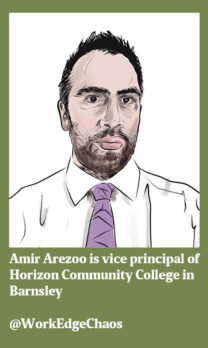Festina Lente
@ijstock
This blogger is apprehensive about the emphasis on the economic utility of education – framed against university education, but then contextualised in secondary terms. It’s a pertinent debate in a context where Ofsted appears to be looking beyond data as the measure of a school’s effectiveness. As this blog rightly suggests, “the real experience of learning can neither be hurried . . . nor packaged and sold in such limited terms”. The classical tradition of education as a means of making sense of the world, and making a contribution to it that is not purely economic, seems to be coming into vogue.
My Best Teacher
@DavidDidau
My best teacher, Neville Parker (a sage if there ever was one – unicycling, piano-playing and lectures on handwriting were highlights of his lessons), shares many traits with Roy Birch, David Didau’s favourite. Straight-talking, passionate about his subject, willing to look past the “front” that many students put on and relentless about getting the best from them – a balance of the necessary personality and initiative that all of us in the profession could and should learn from. Didau’s ode to Mr Birch is heart-warming and overwhelming, and a great opportunity to reflect on those that started the fire for our own career.
Make more of your mornings
@nwmaths
I wholeheartedly agree with Jack Campbell that a great morning routine is golden. The stressful start that many people generate by leaving the alarm to the last minute before crashing out of the door with a slice of toast in one hand and a coffee in the other cannot be sustainable. Instead, as this article suggests, get a routine. A decent amount of sleep and a (relatively) leisurely start to the day is essential for mental and physical health. I particularly concur with the line: “Initially you will miss days. That is fine. Stick with it and avoid the temptation to tell yourself ‘I’ve missed one day, now I might as well not bother’, that’s akin to slashing your three good tyres when one gets a flat.”
How to teach using booklets and a visualiser
@bennewmark
Consider the humble mini-whiteboard. For all that (insert your favourite interactive assessment-for-learning app here) has made inroads into the classroom, teachers often need look no further than what is essentially, the modern version of the slate and chalk.
Ben Newmark argues for another simple set-up: the visualiser and booklet combination, describing the practice that seems to have developed organically in his school: “In most lessons this now means the teacher places their own copy of the booklet the class is working from under the visualiser and reads, or asks pupils to read, from the text. The teacher then highlights key passages and annotates them to illuminate and add further layers of meaning and understanding, while talking through their thought processes. Pupils follow along, adding their teacher’s annotations if they are helpful and their own if there is something else they think worth noting down.”
Whatever your mode of exposition in the classroom (slideshows are not a bad thing in my opinion), I agree with the narrative that modelling of practice should take precedence over the medium by which it is carried out.
Six retrieval practice strategies to use every day
Robbie Russell
Robbie Russell gives some starting points to make retrieval practice work in your setting, without the jargon and reference to evidence bases that (while important) can switch off more cynical colleagues. I like how he sets out the conditions for approaches such as brain dumps, quizzing and discussions to be most effective.
Anyone who has seen a classroom “discussion” that settles very quickly into a talking shop, without any relevance to the matter at hand, can attest to the importance of training students in effective techniques. Preparing students in the routines of a particular practice can be just as important as the content itself. It is exciting to see cognitive science become an accepted part of the educational canon, and it will be interesting to see how this develops.













Your thoughts